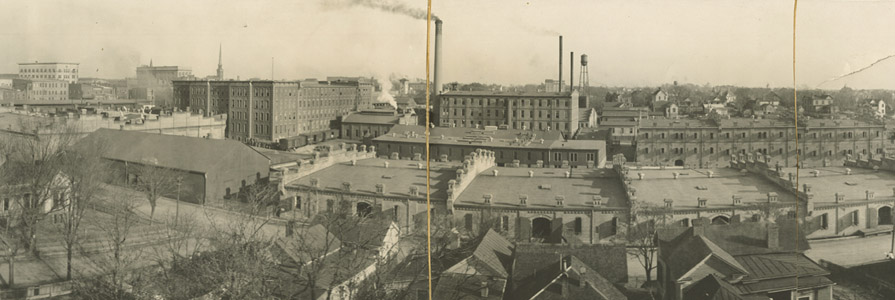See also: Durham (UNC Press)

Durham is the county seat of Durham County. Originally, the land--through which a major Native American trading route passed--was inhabited by such tribes as the Occaneechi and Eno. The town grew up around the railroad station (on the Raleigh-Hillsborough rail line) that was built on 4 acres of land sold to the railroad by Dr. Bartlett Durham in 1854. It was incorporated in 1866.
After the Civil War, tobacco trading began to expand, and Durham became a major center for the industry. The American Tobacco Company--founded by the Duke family--was headquartered in the city for almost a century. The sale of tobacco spurred economic growth in the area and influenced the fortunes of families like the Dukes, whose ongoing endowment in part funds Duke University. Tobacco also indirectly led to Durham's nickname of the "Bull City," after a Durham bull became the advertising emblem of Durham Smoking Tobacco (Wise 2002).
Durham also became a vital center for African Americans in the state. Such institutions as the North Carolina Mutual Life Insurance Co. (founded 1898--the first such African-American owned company in the country), and the Mechanics and Farmers Bank (founded 1907) were the nucleus of what came to be known as "Black Wall Street." In 1910, the first publicly supported liberal arts university for African Americans (NC Central University) was founded. Later, during the Civil Rights era, an early sit-in, which occurred at the Royal Ice Cream Company in 1957, tested the legal limits of segregation.
In the 1920s and '30s, musicians such as Blind Boy Fuller and Blind Reverend Gary Davis helped create the Bull City Blues. The following video is a short documentary on Richard Trice and the Bull City Blues.
The American Dance Festival, the Bull Durham Blues Festival, the Full Frame Documentary Film Festival, the Festival for the Eno, the Nasher Museum of Art--all of these show that Durham was and remains a vibrant center for culture and the arts. Despite the departure of the tobacco giants and the manufacturing sector, Durham has continued to grow. Revitalization projects such as the American Tobacco Historic District and the Durham Performing Arts Center show that it remains a vital part of Piedmont North Carolina.
Durham's estimated population:
1980: 101,149
1990: 136,612
2000: 187,035
2008: 228,480
2009: 234,140
2010: 229,466
2023: 296,186
Durham's land area (square miles):
1980: 42.32
1990: 70.218
2000: 94.636
2008: 105.502
2023: 116.19